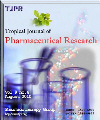
|
Tropical Journal of Pharmaceutical Research
Pharmacotherapy Group, Faculty of Pharmacy, University of Benin, Benin City, Nigeria
ISSN: 1596-5996
EISSN: 1596-5996
Vol. 16, No. 5, 2017, pp. 1187-1193
|
 Bioline Code: pr17152
Bioline Code: pr17152
Full paper language: English
Document type: Research Article
Document available free of charge
|
|
|
Tropical Journal of Pharmaceutical Research, Vol. 16, No. 5, 2017, pp. 1187-1193
| en |
Impact of pharmacist intervention in patient counseling at point of hospital discharge in a specialized cardiac center in Saudi Arabia
Assiri, Turki; Khurshid, Fowad; Almutairi, Meshal; Alhusayyen, Mona; Alkharji, Fahad & Alsultan, Mohammed
Abstract
Purpose: To determine the interventions associated with the pharmacist’s patient counseling and
review of discharge prescriptions of patients from a specialized cardiac center in Saudi Arabia.
Methods: This was a prospective interventional study conducted at Prince Sultan Cardiac Center
(PSCC) in Riyadh, Saudi Arabia for a duration of 12 months. The pharmacist responsible for providing
patient counseling reviewed the patient records, collected patient demographics and clinical data, as
well as medical and medication history, diagnosis and discharge (treatment) plan.
Results: The study included 2008 patients who met the inclusion criteria. The counseling pharmacist
identified and provided interventions to 358 (18 %) patients for 508 (3.4 %) items. About half of
counseling pharmacist interventions concerned involved the addition of a drug to treatment regimen
followed by drug discontinuation (28.1 %). The most common reason for adding the drug during patient
counseling was the omission of medications (35 %). Angiotensin-converting enzyme
inhibitors/angiotensin receptor blockers (ACEI/ARBs), antidiabetics and antihyperlipidemics were the
classes of drugs often associated with counseling pharmacist interventions. The cost-saving
interventions identified were 200 (39.4 %). Out of these, drug discontinuation (n = 143) was the most
frequent suggestion provided by the intervening pharmacist, followed by a dose reduction resulting in
cost savings of 66.5 % (US $ 6,590.10) and 8.9 % (US $ 882.32), respectively.
Conclusion: The results indicate that discharge medication discrepancies decrease as a result of
pharmacist-facilitated patient counseling at the point of hospital discharge.
Keywords
Discharged patients; Cardiac; Counseling; Pharmacist-intervention; Coronary artery disease
|
| |
© Copyright 2017 - Pharmacotherapy Group, Faculty of Pharmacy, University of Benin, Benin City, 300001 Nigeria.
Alternative site location: http://www.tjpr.org
|
|
